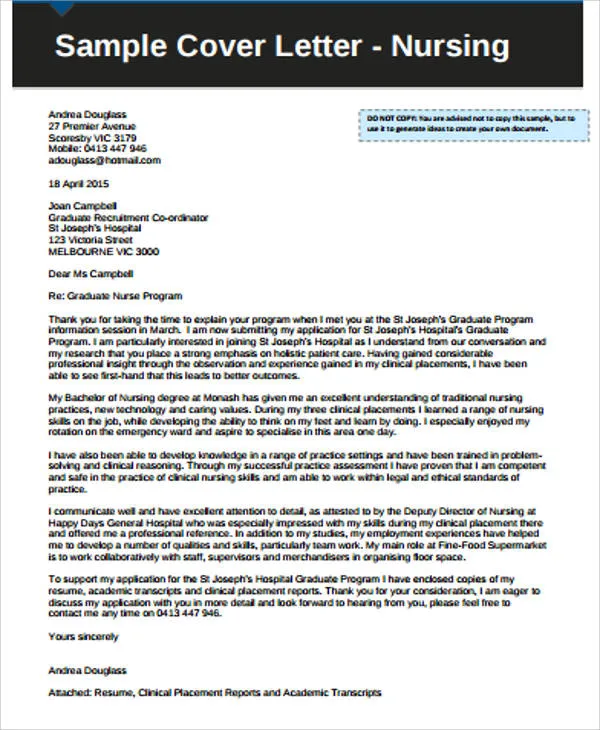What Is a Nursing Cover Letter
A nursing cover letter is a crucial document that accompanies your resume when applying for nursing positions. It serves as your introduction to the hiring manager, providing a snapshot of your qualifications, experience, and passion for nursing. It’s more than just a formality; it’s your opportunity to showcase your personality, highlight your key skills, and explain why you’re the ideal candidate for the role. Unlike a resume, which lists your credentials, a cover letter allows you to tell a story, connecting your experiences to the specific requirements of the job and demonstrating your genuine interest in the opportunity. A well-crafted cover letter can significantly increase your chances of securing an interview and ultimately, landing your dream nursing job. It’s your first impression, and it needs to be a good one.
Why is a Nursing Cover Letter Important
The importance of a nursing cover letter cannot be overstated. In a competitive job market, it sets you apart from other applicants by providing a personalized touch. It allows you to tailor your application to the specific requirements of each job, demonstrating that you’ve taken the time to understand the role and the needs of the healthcare facility. A cover letter helps you highlight the skills and experiences most relevant to the position, giving you the chance to elaborate on your accomplishments and quantify your contributions. This is especially important in nursing, where demonstrating your clinical skills, patient care abilities, and ability to work as part of a team are critical. A well-written cover letter can also showcase your communication skills, professionalism, and enthusiasm, all of which are essential qualities for a successful nurse.
Key Components of a Nursing Cover Letter
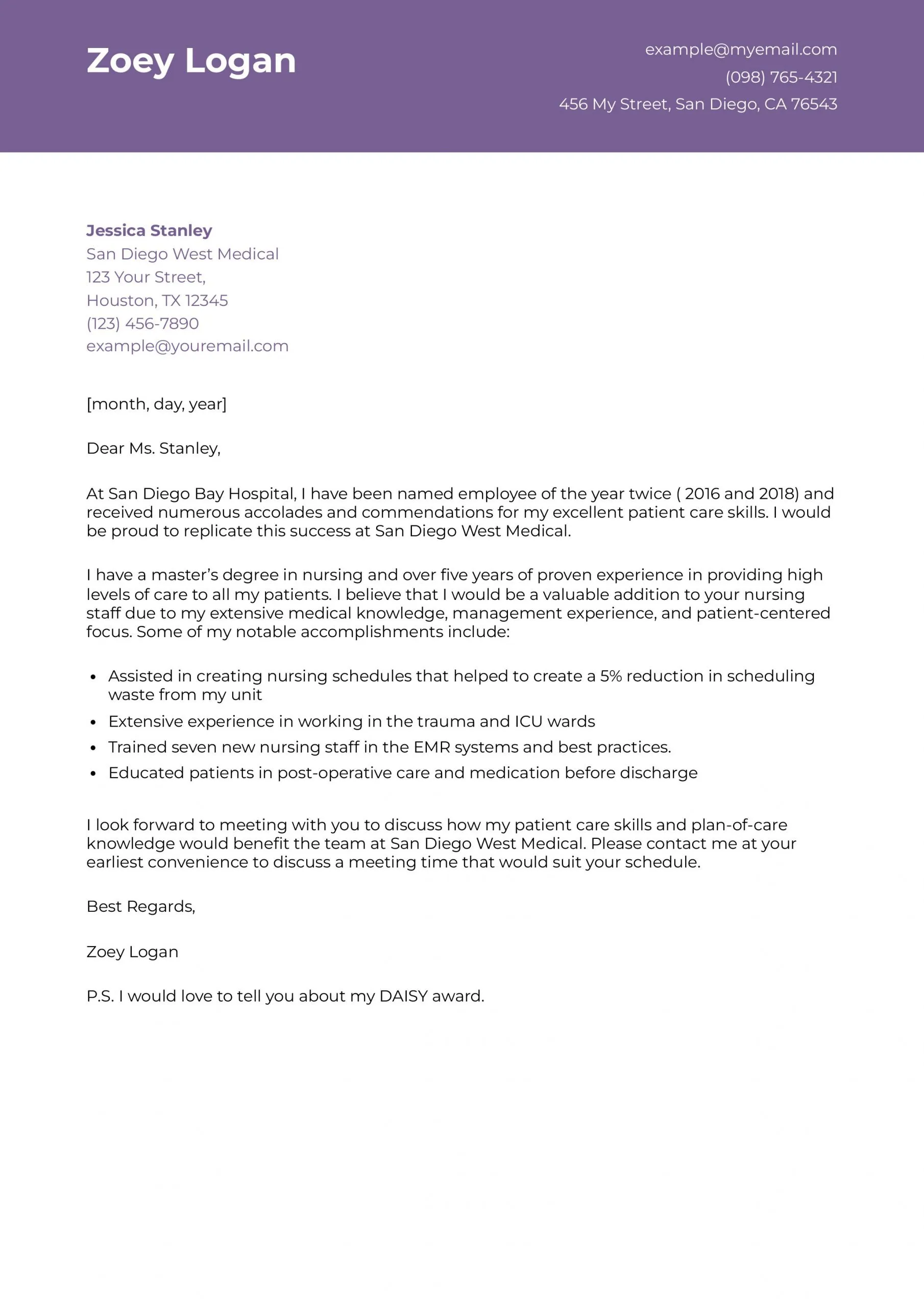
A strong nursing cover letter is comprised of several key components, each playing a vital role in conveying your qualifications and suitability for the role. These include a professional header, a compelling greeting, well-structured body paragraphs, and a confident closing. Each section should work together to paint a clear picture of your skills, experience, and passion for nursing. Attention to detail, clear and concise language, and a professional tone are essential throughout the document. Ensure that your cover letter is free from grammatical errors and typos, as these can undermine your credibility. The overall goal is to create a polished and persuasive document that grabs the hiring manager’s attention and compels them to learn more about you.
Header of Your Cover Letter
The header is the first element of your cover letter and should include your contact information, the date, and the recipient’s information. A well-formatted header gives your cover letter a professional appearance and makes it easy for the hiring manager to contact you. Ensure that your header is consistent with the formatting of your resume. The contact information should include your full name, phone number, email address, and optionally, your LinkedIn profile URL. The date should be the date you are sending the cover letter. The recipient’s information should include the hiring manager’s name, their title, and the address of the healthcare facility. If you cannot find the hiring manager’s name, address the letter to the ‘Hiring Manager’.
Contact Information
Include your full name, phone number, email address, and optionally, your LinkedIn profile URL. Double-check all information for accuracy.
Date
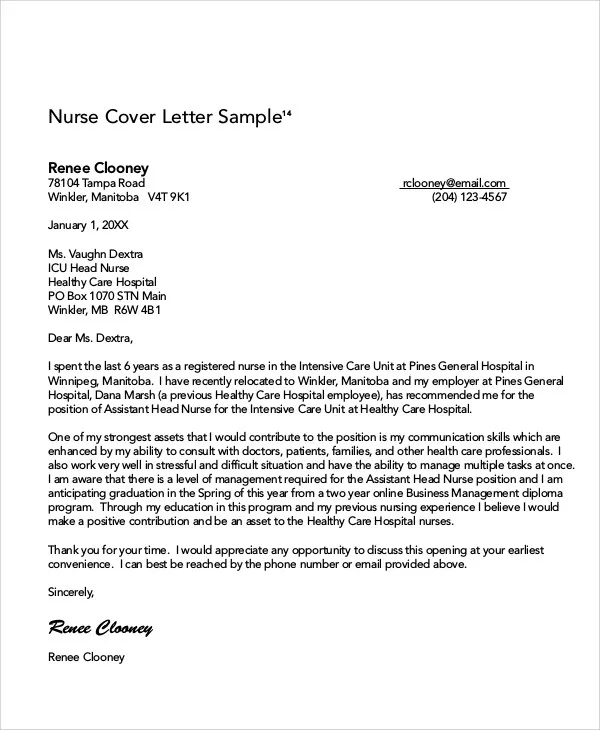
Use the current date on which you are submitting your application.
Recipient’s Information
If known, include the hiring manager’s name, title, and the healthcare facility’s address. If the name is unavailable, use a general salutation such as ‘Hiring Manager’.
Greeting
Start your cover letter with a professional greeting. If you know the hiring manager’s name, use ‘Dear Mr./Ms./Mx. [Last Name]’. Otherwise, a general greeting like ‘Dear Hiring Manager’ or ‘Dear [Department Name] Team’ is appropriate. Avoid overly casual greetings.
Body Paragraphs
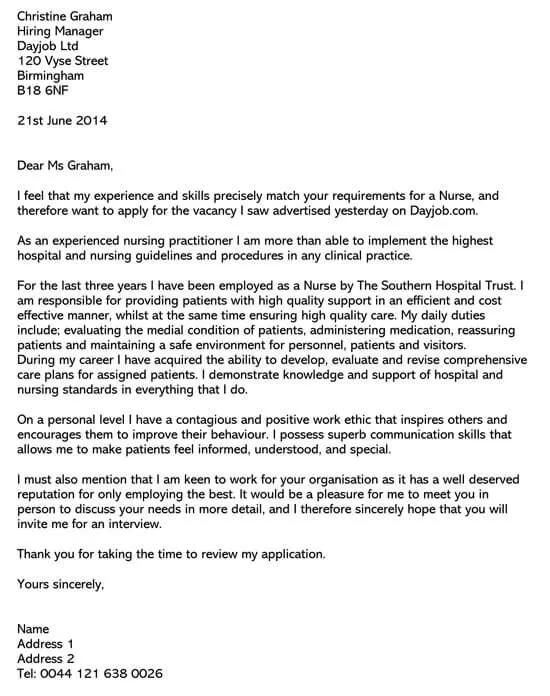
The body of your cover letter is where you highlight your skills, experience, and passion for nursing. This section should be well-structured, with each paragraph focusing on a specific aspect of your qualifications. Use clear, concise language and avoid jargon that the hiring manager may not understand. Tailor your body paragraphs to the specific requirements of the job description, demonstrating how your skills and experience align with their needs. Provide specific examples of your accomplishments, and quantify your results whenever possible. This section is the core of your letter, it’s where you make your case for why you are the perfect candidate.
First Paragraph Introduction
Begin your first paragraph by stating the position you are applying for and how you learned about the opportunity. Clearly express your interest in the role and the healthcare facility. This opening paragraph should immediately capture the hiring manager’s attention and make them want to read more. It should convey your enthusiasm for the position and set the tone for the rest of your letter. Briefly mention your relevant experience or a key skill that aligns with the job requirements. Make a strong first impression by showing that you understand the facility’s mission and values.
Express Your Interest and Enthusiasm
Clearly state your interest in the position and express your enthusiasm for the opportunity. This demonstrates your proactive attitude and eagerness to contribute to the team.
Mention the Position
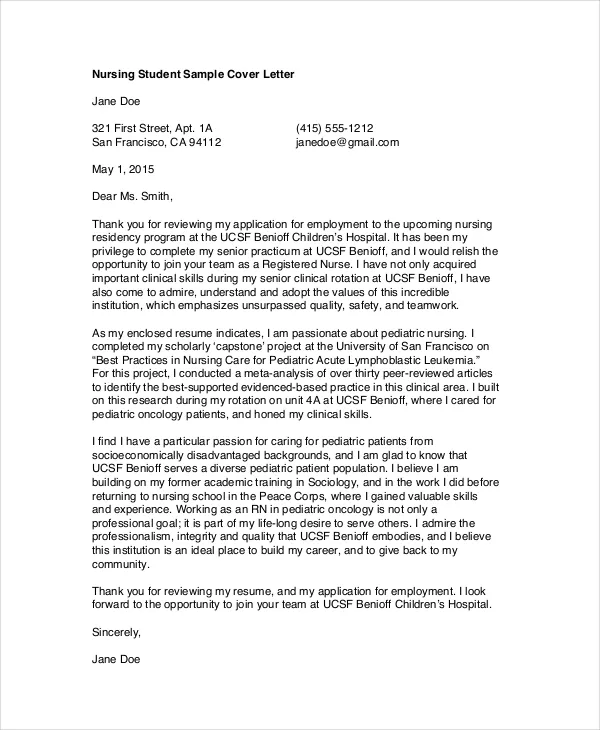
Specify the exact nursing position you are applying for. Be clear and direct about the role you are targeting.
Highlighting Relevant Skills and Experience
In the subsequent paragraphs, highlight your skills and experience that align with the job description. Focus on the requirements mentioned in the job posting and provide specific examples of how you have successfully utilized these skills in previous roles. Use action verbs to describe your accomplishments and the impact you made. Customize this section to match the needs of each job you apply for. This section is your chance to show that you meet and exceed the job’s requirements and that you have the practical knowledge to excel in the role. Make it evident that you have the competencies the hiring manager is looking for.
Focusing on Achievements
Focus on your achievements and what you have accomplished in your past roles. Quantify your accomplishments using data, such as the number of patients you cared for or improvements in patient outcomes.
Quantify Your Accomplishments
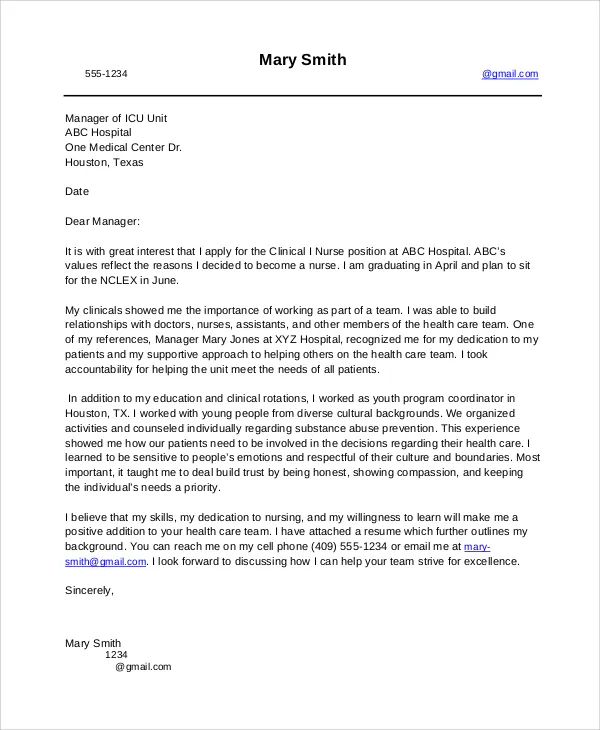
Wherever possible, quantify your achievements. Use numbers and data to demonstrate the impact of your work. For example, mention the percentage of patient satisfaction you achieved or the number of lives saved. Numbers make your accomplishments more concrete and help the hiring manager understand your impact.
Demonstrating Your Passion for Nursing
Demonstrate your passion for nursing by sharing what motivates you and what you love about the profession. This could include your commitment to patient care, your desire to learn and grow, or your ability to work as part of a team. Show that you are passionate about nursing, and explain what about the position and the healthcare facility excites you. This can involve sharing specific examples of how you have gone above and beyond to provide exceptional care or highlighting what inspires you about the mission of the hospital.
Highlight Your Motivation and Goals
Explain your motivation for applying for the position and your career goals. Show that you are looking to grow and contribute to the healthcare facility’s mission.
Closing Paragraph
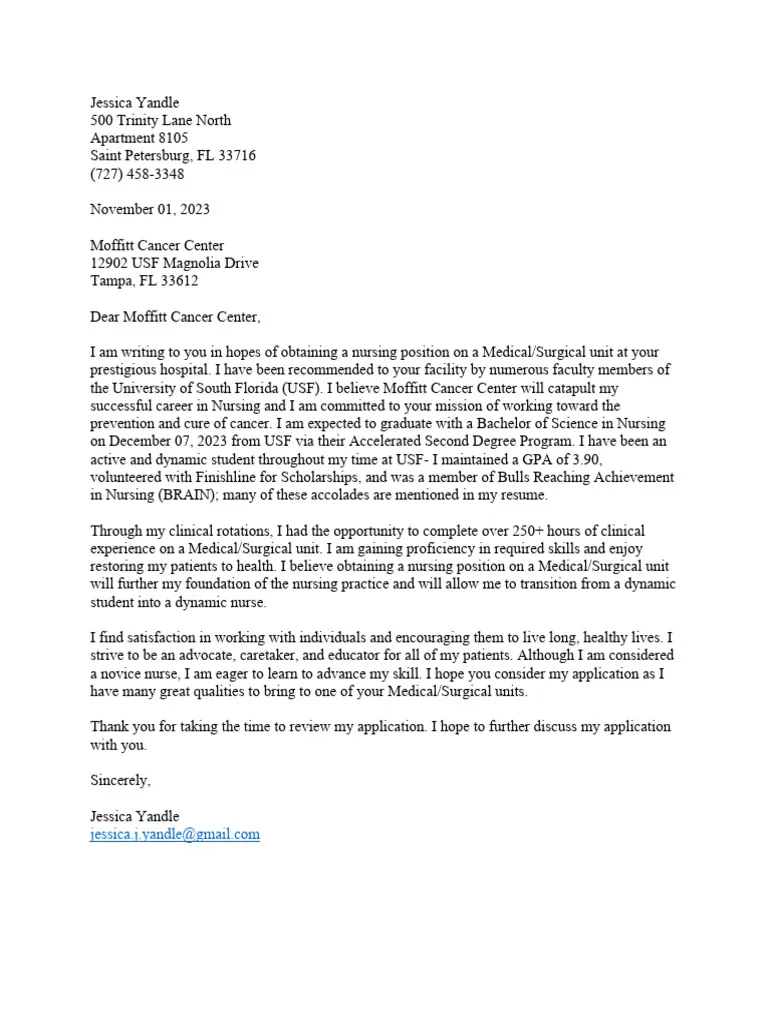
The closing paragraph should reiterate your interest in the position, express your gratitude for the hiring manager’s time, and include a call to action. This section should leave a lasting impression on the hiring manager. Thank them for considering your application, and reiterate your interest in the role. Provide a clear call to action by stating your availability for an interview and your willingness to provide any additional information. End on a positive and professional note to ensure you leave a positive lasting impression.
Expressing Gratitude
Thank the hiring manager for their time and consideration. Express your appreciation for the opportunity.
Call to Action
Clearly state your availability for an interview and your willingness to provide any additional information. Make it easy for the hiring manager to contact you.
Closing
Use a professional closing, such as ‘Sincerely’ or ‘Respectfully,’ followed by your typed name.
Formatting and Design
The formatting and design of your cover letter are essential for readability and professionalism. Use a clean and easy-to-read font, such as Times New Roman or Arial, and maintain consistent formatting throughout the document. Use white space to separate different sections and make the letter visually appealing. Proper formatting makes your cover letter easy to read and demonstrates your attention to detail. Ensure that your cover letter is well-organized with clear headings and bullet points to make it easy for the hiring manager to quickly find the information they need. Keep the formatting consistent with your resume to present a unified image.
Font and Font Size
Use a professional and readable font, such as Times New Roman or Arial, with a font size between 10 and 12 points.
Layout and White Space
Use clear and concise language, and maintain consistent formatting throughout the document. Use white space to separate different sections and make the letter visually appealing. Proper formatting makes your cover letter easy to read.
Proofreading and Editing
Proofreading and editing your nursing cover letter are critical steps. Carefully review your letter for any grammatical errors, typos, or inconsistencies in formatting. Ask a friend, colleague, or career counselor to review your letter before you submit it. A well-proofread cover letter shows professionalism and attention to detail. Make sure that your cover letter reflects your skills and experience. It’s also important to ensure that your cover letter flows logically and that your writing style is clear and concise.
Common Mistakes to Avoid
Avoiding common mistakes can significantly improve the effectiveness of your nursing cover letter. Make sure your cover letter is personalized and tailored to the specific role. Avoid generic language, and do not simply repeat information from your resume. Proofread your cover letter carefully to eliminate any typos or grammatical errors, as these can damage your credibility. Do not exceed the recommended length of one page; keep it concise and focused. Be aware of the common mistakes to make a strong cover letter.
Generic Language
Avoid using generic, impersonal language that could apply to any job. Tailor your cover letter to each position and demonstrate your understanding of the specific requirements.
Typos and Grammatical Errors
Thoroughly proofread your cover letter to eliminate any typos, spelling errors, or grammatical mistakes. These errors can create a negative impression and undermine your professionalism.
Exceeding the Recommended Length
Keep your cover letter concise and focused, ideally within one page. Avoid including unnecessary information or rambling sentences. A concise cover letter is easier to read and more likely to capture the hiring manager’s attention.
Conclusion
A well-crafted nursing cover letter is a powerful tool that can significantly increase your chances of landing an interview. By following these guidelines, you can create a cover letter that showcases your qualifications, highlights your accomplishments, and demonstrates your passion for nursing. Remember to tailor your cover letter to each specific job, and always proofread it carefully before submitting it. With a strong cover letter, you’ll be well on your way to securing your dream nursing position. Good luck with your job search!
